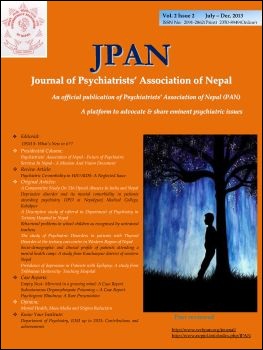Prevalence of depression in Patients with Epilepsy: A study from Tribhuvan University- Teaching Hospital
DOI:
https://doi.org/10.3126/jpan.v2i2.9725Keywords:
Epilepsy, depression, co-morbidityAbstract
Background: Epilepsy is often associated with mental and behavioral problems. Depression is one of the commonest psychiatric comorbidity among patients suffering from epilepsy leading to poorer seizure control and adversely affecting their quality of life. The objectives of this study were to know the prevalence of depression among patients with epilepsy and to see for any association with demographic and clinical variables.
Method: A cross sectional study was carried out in patients with epilepsy attending psychiatry outpatient department in a tertiary care hospital, Tribhuvan University-Teaching Hospital (TUTH). All consecutive patients with epilepsy meeting inclusion and exclusion criteria were involved in the study after obtaining informed consent. Depression was diagnosed using semi structured proforma and ICD-10 DCR criteria. Data was analyzed using SPSS version 16 and analysis carried out using descriptive statistics.
Results: Out of total 68 patients, 58.8% were male. About 54.4% of subjects were single and 26.5%were students. Out of the total subject, 79.4% were from rural areas. About 37%cases were having depression at the time of the interview. Male gender, younger age, having generalized epilepsy was more associated with depression.
Conclusion: Depression was found to be highly prevalent psychiatric co- morbidity among the patients with epilepsy. Patients of younger age group, men and having generalized epilepsy were more prone to have depression. The study emphasized need for proper psychiatric evaluation for overall management of patients with epilepsy.
DOI: http://dx.doi.org/10.3126/jpan.v2i2.9725
J Psychiatrists’ Association of Nepal Vol.2, No.2, 2013 39-42
Downloads
Downloads
Published
How to Cite
Issue
Section
License
This license enables reusers to distribute, remix, adapt, and build upon the material in any medium or format, so long as attribution is given to the creator. The license allows for commercial use.




